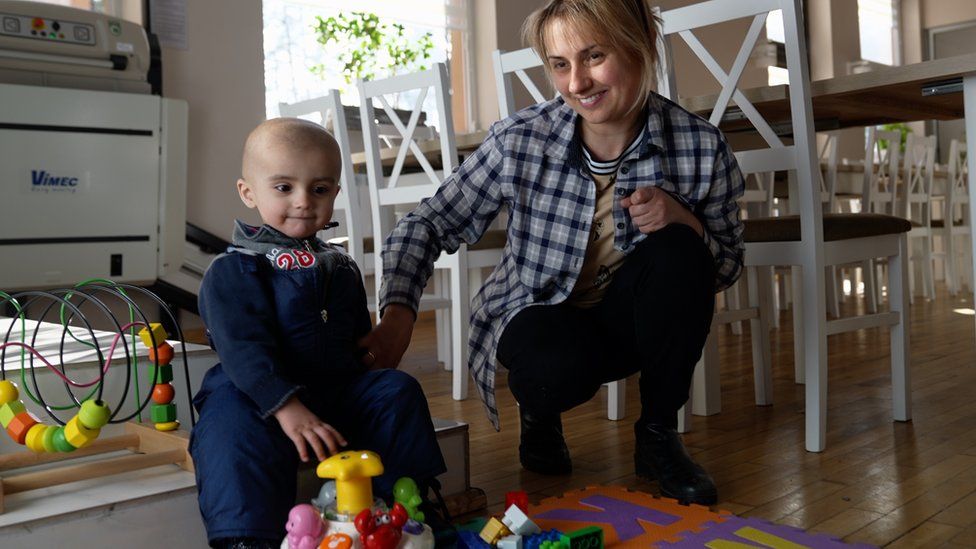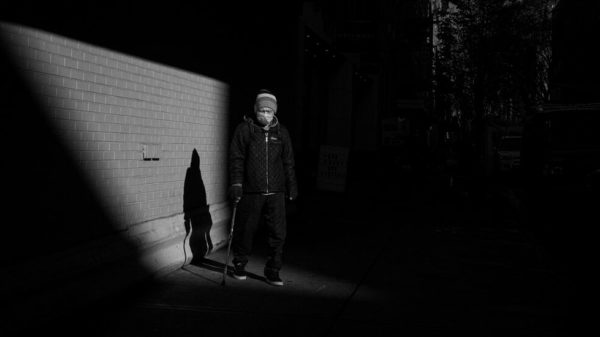More than 600 children with cancer have now been evacuated from Ukraine in order to resume life-saving treatment in Europe and North America. About 200 hospitals worldwide have offered care – without which, the children have no chance of survival. Doctors helping to co-ordinate the international effort say it’s the largest rescue mission of its kind.
The BBC recently spent time at a hotel in Poland, which is now being used as a safe place for families fleeing the conflict to rest before being relocated for cancer treatment.
Eighteen-month-old Pavlo, who has bone cancer, is playing happily with toys after the first stage of his journey.
He is one of many Ukrainian children with cancer being assessed by an international team of doctors before being flown abroad for medical care – 21 of whom have been sent to the UK.
‘I had to leave for my son’
Not so long ago, Pavlo was a healthy toddler living peacefully with his older sister, mother and father near Lviv, in Ukraine.
But then he was diagnosed with a rare type of cancer, and chemotherapy treatment began. When the war started, air raid sirens sounded night and day – forcing the family to hide in a basement shelter.
“It was a great stress for my boy. At night he was scared. I would take him asleep in my arms and run down the stairs,” his mother Lesia says.
To give him the best chance of life, she had no choice but to flee to Poland.

“Until the last moment I was not prepared to leave home,” she says. “Home is home. But the doctor warned me that one of the treatment drugs might run out.”
Pavlo and his mum travelled in a convoy of vehicles taking 40 child cancer patients and 100 family members from the Western Ukrainian Specialized Children’s Medical Center, in Lviv, to the Unicorn Clinic – a hotel-turned-triage-centre – in central Poland. They are the fifth group to be transported there since early March.
The evacuations have been organised jointly by US children’s research charity St Jude, Polish child cancer specialists the Heroes Foundation, and Tabletochki Charity Foundation in Ukraine.
Children’s medical records are translated to accompany them on the next stage of their journey – to hospitals in Germany, Spain, Italy, Switzerland, Netherlands, Canada, US and the UK. More are signing up to help every day.
Doctors on the ground say more than 2,000 children with cancer may still need help to leave Ukraine. Some can’t leave because they are just too seriously ill. Those who can, need urgent treatment.

The effort to evacuate hundreds of children with cancer in convoys is “exceptional” and has never been seen before, says Dr Roman Kizyma, a paediatric oncologist who is helping to co-ordinate the evacuation from Lviv.
As early as the third day of the war, he realised it was no longer possible to treat them safely in Ukraine.
‘They are fighting two wars’
“They are catastrophically ill,” Dr Kizyma says. “So they could all die with the interruption of treatment, thousands of them or even more. Without treatment they have no chance. With treatment, 70 to 80% can be cured.”
He says he’s angry about what’s happened and he wants the Russians to pay for the pain and devastation they’ve caused the families. “Now they have two wars – one against cancer and the other against Russia,” he says.
Natalia Lavrova and her three-year-old son Kyril have also just arrived at the triage clinic, deep in the Polish countryside, after a long 10-hour journey by train and bus from Lviv. Nothing can erase the horror of the last few weeks, though.
This video can not be played
To play this video you need to enable JavaScript in your browser.
In February, just days before Russian attacks began, Kyril was diagnosed with a brain tumour. He’d had headaches, and had been vomiting and sleeping all the time.
“We had an operation scheduled. We were already at the hospital with my boy,” she says. “My husband called me in the morning and said ‘the war has started’. Our Dnipro, the city where we live, was being bombed.
“It doesn’t sit right in my head. It’s like some nightmare,” she explains in Russian, her mother tongue.
Psychological impact
The trauma faced by these children and their families cannot be overstated, says Dr Asya Agulnik, a paediatric intensive care doctor from St Jude Children’s Research Hospital in Memphis, who is welcoming them as they arrive in Poland.
There’s the psychological trauma of being uprooted from where they live and then being transported to another country – on top of the anxiety around their cancer therapy being interrupted.
“It’s a significant impact – both medically and psychologically,” Dr Agulnik says. The children are already extremely complicated and fragile patients, and moving them is a calculated risk, she explains.
Volunteers at the Unicorn Clinic are ready to offer support where they can – and some are also refugees themselves, like therapist Ina Anbousi.

Ina came with the first busload of children fleeing Ukraine in early March, and has helped the wellbeing of all those who’ve passed through the clinic since.
She’s kept in touch with children being treated in other countries, including families who have come to the UK.
“It inspires me, and it fills me with happiness because they send me short movies: where they live, where they stay,” she says.
“I can’t imagine in this dark, terrifying war that our Ukrainian kids have a chance to have treatment in such a nice place.”
Igor and Anastasia, both 21, have left their university studies in Ukraine to volunteer at the clinic “to do something useful for my country”, they say.
When lifted on to Igor’s shoulders, Yaroslav – whose brother is being treated for his cancer in a nearby Polish hospital, accompanied by his mum – smiles broadly.
Where his family will eventually end up is still not clear, but for now he can relax and play in safety.

















